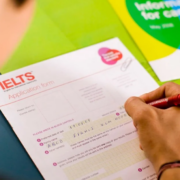How can I practice for IELTS exam?
Preparing for the International English Language Testing System (IELTS) requires a strategic and disciplined approach to ensure success in all four modules – Listening, Reading, Writing, and Speaking. In this blog, we will delve into a comprehensive guide on how to practice effectively for the IELTS exam, covering various strategies and resources to optimize your preparation.
Also Read: The Role and Responsibilities of an Assistant in Nursing
Understand the Test Format:
Before delving into practice, it’s crucial to have a solid understanding of the IELTS test format. Familiarize yourself with the structure of each module, the types of questions you will encounter, and the time constraints. This foundational knowledge will guide your practice efforts and help you tailor your preparation to the specific demands of the exam.
Create a Study Schedule:
Effective IELTS preparation requires consistency and organization. Create a study schedule that allocates dedicated time to each module. Consider your strengths and weaknesses, giving more time to areas that need improvement. A well-structured study plan ensures that you cover all aspects of the exam and steadily progress in your preparation.
Listening Practice:
To enhance your skills:
Listen Actively: Regularly listen to podcasts, radio programs, and academic lectures. Focus on understanding the main ideas and details.
Use Authentic Materials: Practice with authentic IELTS listening materials. These could include past exam papers, online practice tests, and official IELTS practice resources.
Simulate Test Conditions: Practice listening under timed conditions to improve your ability to concentrate and manage time effectively during the actual exam.
Reading Practice:
The Reading module evaluates your ability to comprehend written texts. Sharpen your reading skills with the following strategies:
- Diverse Reading Materials: Read a variety of materials, including newspapers, magazines, and academic articles.
- Time Management: Practice reading passages and answering questions under time constraints.
- Expand Vocabulary: Enhance your vocabulary by learning new words and understanding their usage in context. A strong vocabulary is crucial for tackling the diverse range of texts in the Reading module.
Writing Practice:
The Writing module assesses your ability to express ideas clearly and coherently in written English. Develop your writing skills through the following:
Essay Writing: Practice writing essays on various topics, ensuring you adhere to the recommended word count. Focus on developing a clear thesis, providing supporting details, and maintaining a logical structure.
Task 1 and Task 2: Practice both Task 1 (data interpretation or describing visuals) and Task 2 (essay writing) components. Pay attention to time management and ensure that your responses meet the specific requirements of each task.
Receive Feedback: Seek feedback on your writing from teachers, tutors, or language exchange partners. Constructive feedback is invaluable in identifying areas for improvement.
Speaking Practice:
Hone your speaking skills with these strategies:
Engage in Conversations: Regularly engage in English conversations with native speakers, language exchange partners, or fellow test-takers. This will help improve your fluency and pronunciation.
Practice Speaking Topics: Familiarize yourself with common IELTS test practice speaking topics. Practice responding to questions coherently and expressively.
Mock Interviews: Conduct mock interviews to simulate the speaking test environment. Record yourself to identify areas for improvement, such as clarity of expression and pronunciation.
Utilize Official IELTS Practice Materials:
The British Council, IDP, and Cambridge provide official IELTS practice materials that closely resemble the actual exam. Utilize these resources to get a sense of the test format, question types, and level of difficulty. Official materials offer the most accurate representation of the IELTS exam.
Online IELTS Test Practice:
Explore various online platforms that offer IELTS test practice tests. These resources often include timed mock exams for each module, providing an opportunity to simulate test conditions and identify areas for improvement.
Join IELTS Preparation Courses:
Consider enrolling in IELTS preparation courses offered by reputable institutions. These courses often provide structured content, expert guidance, and opportunities for interactive practice sessions. Additionally, the feedback from experienced instructors can significantly enhance your preparation.
Self-Assessment and Reflection:
Regularly assess your progress by reviewing your practice test results and identifying areas where you can improve. Reflect on your performance, consider feedback received, and adjust your study plan accordingly. Self-assessment is crucial for refining your strategies and building confidence.
In-depth Content Coverage:
“Mastering IELTS” delves into each section of the IELTS exam—Listening, Reading, Writing, and Speaking—with a thorough examination of the skills required for success. The guide breaks down the intricacies of each module, providing detailed explanations and examples to ensure a complete understanding of the test format.
Effective Time Management:
Time is a critical factor in the IELTS exam, and this guide emphasizes efficient time management strategies. Learn how to allocate time wisely during the exam, striking a balance between speed and accuracy to maximize your potential in each section.
Writing Excellence:
Achieving a high band score in the Writing module requires more than just language proficiency. This guide provides step-by-step guidance on structuring essays, expressing ideas coherently, and addressing specific task requirements. Learn how to impress the examiners with sophisticated vocabulary and well-crafted arguments.
Conclusion:
Mastering the IELTS test practice requires a multifaceted approach that addresses each module’s unique challenges. By understanding the test format, creating a structured study schedule, and engaging in targeted practice, you can significantly enhance your chances of achieving the desired band score. Remember, consistency and dedication are key in the journey to IELTS test practice success. Best of luck on your path to mastering the English language proficiency test!











Leave a Reply
Want to join the discussion?Feel free to contribute!